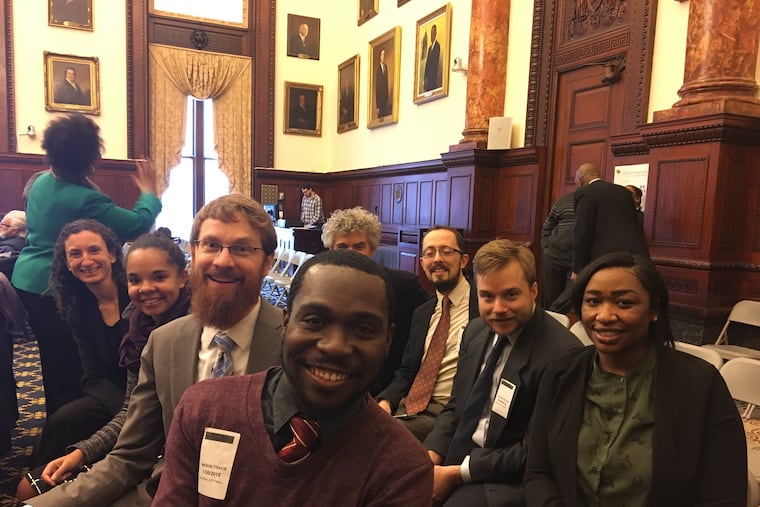We have a tool to fix Philly’s eviction crisis | Opinion
The Philadelphia Bar Association found that tenants without legal representation are disruptively displaced due to eviction in 78 percent of cases, compared to 5 percent of represented tenants.

As we enter Black History Month, many of us are given an amplified platform to speak out against the widespread racial injustice across this country, and given space to discuss how we can mandate that fairness underlie all of this nation’s institutions. One of the starkest inequities in our society is housing. Every person should have the opportunity to live in a safe, stable home, but for too many black people and people of color, that simply isn’t the reality.
That divide persists in Philadelphia. An ACLU report highlights how “women of color bear the burden of eviction,” noting a 2001 study that found women of color to be 70 percent of tenants facing eviction in the city. America has a broad eviction crisis that forces tenants into displacement and homelessness across the country. But clearly America’s eviction crisis also has a race problem.
Eviction filings, even when controlling for other factors like income and education, disproportionately affect black people and people of color. Philadelphia’s black community sees eviction rates more than three times as high as white Philadelphians. This makes race one of the most reliable predictors of eviction. And once tenants are evicted, it’s nearly impossible to find good housing. Often, the only landlords who will consider renting to tenants with eviction records are operating unsafe, substandard housing. One of our clients with previous evictions is renting a property that has been cited by Licenses and Inspections for a serious rat infestation and lack of running water. These limited options only exacerbate the high rates of housing instability suffered by black people and people of color.
Fortunately, one of the most effective solutions for preventing eviction and housing instability is already in effect around the country: civil legal aid. Civil legal aid provides access to free legal help for people to protect their livelihoods, their health, and their families. Our goal in providing aid at Philadelphia’s Community Legal Services Inc. is to ensure fairness for all in the justice system, regardless of income, race, or gender.
Civil legal aid means that tenants facing eviction in court don’t have to do it alone. In Philadelphia, the city has partnered with civil legal aid agencies, including Community Legal Services, to create the Philadelphia Eviction Prevention Project (PEPP). The program introduces an innovative model to connect tenants facing eviction with legal representation, court assistance, financial counseling, a live hotline, a walk-in help center and educational materials. Based on our preliminary findings from the first year, tenants who got help from a PEPP advocate saw better outcomes than those that did not, whether by showing up for court, winning their cases, or reaching agreements with their landlords.
In Philadelphia alone, a recent report commissioned by the Philadelphia Bar Association found that tenants without legal representation are disruptively displaced due to eviction in 78 percent of cases, compared with 5 percent of represented tenants. That means that for many families of color, civil legal aid makes the difference between living safely at home and being forced into homelessness.
Despite the increased resources provided through PEPP, the city stills needs more civil legal aid. Approximately 80 percent of landlords have representation, while tenants are represented in only 8 to 10 percent of cases.
Several cities are considering universal access to this crucial legal representation. In 2017, New York City was the first municipality to pass “right to counsel” legislation, guaranteeing that all low-income tenants facing an eviction in court would be assigned an advocate to assist with their case. Since then, other cities have followed: San Francisco enacted right to counsel for all tenants in June of 2018, and Newark for low-income tenants in December 2018. Cities across the country, including Philadelphia, should follow suit. We are grateful that Mayor Jim Kenney and City Council are considering this step.
Investing in legal aid and a right to counsel for tenants is not only cost efficient for cities, as every dollar spent on legal aid for tenants yields an estimated benefit of $12. It’s also one of the most effective approaches to prevent evictions, housing instability, and homelessness — and to address the racial disparities that mark those problems. Few services can do as much to promote equity for communities of color, defend against gentrification’s negative ramifications, and alleviate the pangs of institutional racism. In the fight to create a more equitable society, civil legal aid is one of our country’s most powerful tools.
Rasheedah Phillips is the managing attorney of Community Legal Services’ housing unit. Jenna Collins is a staff attorney in Community Legal Services’ housing unit. rphillips@clsphila.org and jcollins@clsphila.org